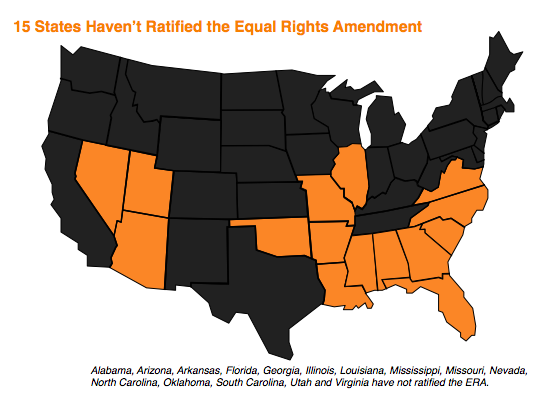The debate over an Equal Rights Amendment began three years after women received the right to vote -- and continues today. The proposal was recently re-introduced in Congress, along with a new strategy.
The Equal Rights Amendment was First Proposed 90 Years Ago
The Equal Rights Amendment -- proposing an amendment to the U.S. Constitution that guarantees equal rights under the law for Americans regardless of their sex -- was first introduced in Congress in 1923. Almost 50 years later, Congresswoman Martha Griffiths (D-MI) filed a discharge petition on the Equal Rights Amendment (ERA) in 1970 to send it directly to the House floor for a vote. (A discharge petition requires the signatures of a majority of House members to succeed. It's also the star in Legally Blonde 2!)
Congresswoman Griffiths was able to get the necessary 218 signatures on her discharge petition (see the signatures) in 1970, and the ERA was passed by the House that same day. In the Senate, however, opponents added an amendment exempting women from the military draft, which Griffiths battled against. She introduced the ERA again in the next Congress, and it was passed by the House in 1971 and by the Senate in 1972. Congress also proposed a deadline that required ratification by three-fourths of the states (38) within seven years, which was later extended to 10 years. By 1982, the Amendment had the approval of 35 states -- three short to change the Constitution.

The ERA Discussion Continues Today
With nearly half of states today including some version of an equal rights amendment written into their state constitution, proponents of the U.S. Constitutional Amendment are supporting it to "provide the courts with clearer guidance" regarding discrimination on the basis of sex, according to Sen. Ben Cardin (D-MD). He has proposed a bipartisan resolution to remove the deadline for the states' ratification of the Equal Rights Amendment. If this resolution passes, then the ERA would become law once three additional states ratify it. (The states that haven't ratified the ERA are: Alabama, Arizona, Arkansas, Florida, Georgia, Illinois, Louisiana, Mississippi, Missouri, Nevada, North Carolina, Oklahoma, South Carolina, Utah and Virginia.)
ERA Proposals Pending Before Congress
Weigh in on the Equal Rights Amendment -- and whether the deadline for ratification should be removed. POPVOX will deliver your message to your lawmakers.
- The Equal Rights Amendment: Proposing an amendment to the U.S. Constitution relative to equal rights for men and women. (SJRes 10 in the Senate and HJRes 56 in the House.)
- A joint resolution removing the deadline for the ratification of the equal rights amendment. (SJRes 15 in the Senate and HJRes 43 in the House.)
